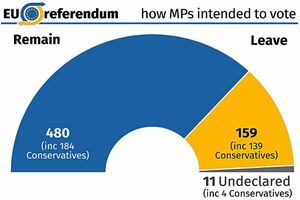Brexit legal challenge: High Court judgement slammed as 'betrayal of democracy'
Enraged West Midlands MEP Bill Etheridge has branded a High Court ruling blocking Theresa May from triggering Article 50 without parliamentary consent as 'a betrayal of democracy'.

He said the decision, which means MPs will be given greater powers of scrutiny over EU negotiations, was an 'utterly contemptible' attempt to 'disregard the will of the people'.
The ruling means the Prime Minister cannot start formal discussions on Brexit without gaining parliamentary approval.
It has been welcomed by campaigners and MPs who have called for greater scrutiny of the Brexit process, but Brexit backers have responded with fury.
The government has confirmed it will appeal the decision in the Supreme Court and said it had 'no intention' of letting the judgement derail Article 50.
Ukip's Mr Etheridge said: "The decision is an absolute disgrace and a betrayal of democracy.
"Serious questions must be asked about the motives behind the case being brought in the first place.
"Opponents of Brexit have tried everything to stop it from becoming a reality. This is a shameful attempt to circumvent democracy and disregard the will of the people. It is utterly contemptible."
He added: "I hope the decision is overturned, but if it does go to the Commons then any West Midlands MPs that vote against the will of the people will be considered traitors to democracy and traitors to this country."
MORE: Wolverhampton woman's key role in High Court case
MORE: Why Brexit legal challenge could be more damaging than referendum row

The landmark case, which was brought by investment manager Gina Miller, looked at whether the government is entitled to give notice of a decision to leave the EU by exercise of prerogative powers and without reference to Parliament.
Lichfield's Conservative MP Michael Fabricant, said: "Seventeen million people voted to leave the EU and it would be completely wrong of MPs to try and undermine this decision."
"The complainants in this case keep suggesting that notice to withdrawal from the EU could be unlawful, which is simply not true. It is clear that a lot of MPs and others are saying they respect the Brexit decision, while in fact they are doing everything they can to sabotage it."

Labour's deputy leader Tom Watson, who campaigned for Remain in the EU referendum, welcomed the decision. He said: "The British people voted to leave the EU, which is not the same as a vote to allow Theresa May to make a decision on the actual deal.
"The whole debate during the EU referendum was about taking power back to the people and away from unelected representatives in Brussels.
"Our MPs are elected by the people to make decisions on their behalf, so it seems entirely reasonable that they should be involved in scrutinising something as important as leaving the EU."
Wolverhampton South East Labour MP Pat McFadden has also backed the judgement, but said he did not think that Parliament would consider blocking the triggering of Article 50.
"This is a humiliation for Theresa May and her government, which has been too fearful of meaningful scrutiny of Brexit," he added.
"The government cannot survive for the next three years by accusing anyone asking questions about the Brexit process of trying to deny the result of the referendum.
"A parliamentary say on Article 50 is not about trying to deny the result. All this will mean, if the judgement stands, is that the government will have to give MPs a greater say over the terms on which we leave the EU."
Wolverhampton North East MP Emma Reynolds said the government 'should have allowed parliamentary scrutiny from the beginning'.
"The vote was to leave the EU but it didn't present any of the various options for the terms of that deal. It is therefore only right that the government presents its negotiating objectives to Parliament and asks MPs to approve them in a vote."
The UK voted for Brexit by a margin of 51.9 per cent to 48.1 per cent.





